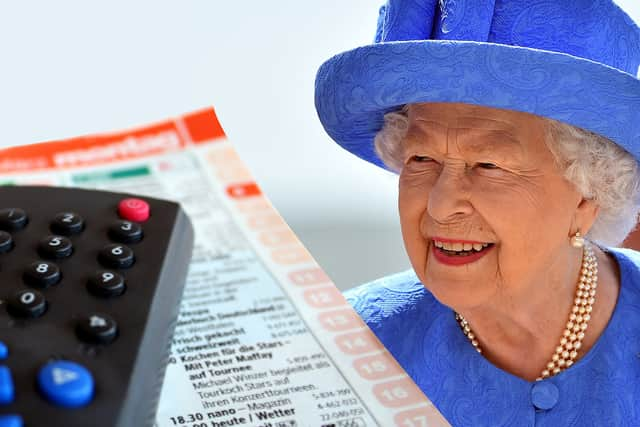What happens to TV schedules after Queen’s death? What have BBC and other channels said - is comedy banned?
and live on Freeview channel 276
The death of a royal is something that has a wide reaching – even all-encompassing – impact on society. That impact has been most immediately and most visibly felt on television, from disrupted schedules to newsreaders wearing all black.
As part of Operation London Bridge – the longstanding plans for how the government, civil service, and broadcasters will respond to the death of the Queen – a number of procedures are in place with regards to television. These procedures are intended to both define the news coverage of the Queen’s death, and in some cases to restrict the broadcast of any unrelated programming.
Advertisement
Hide AdAdvertisement
Hide AdHere’s everything you need to know about how television has responded to and has been impacted by the death of the Queen.
How will the BBC respond?


Already, the BBC has pre-empted much of its coverage – cancelling afternoon programming like Antiques Roadshow – in favour of a rolling news item discussing the Queen’s health. Both presenters and guests have been dressed in sombre clothes; after the death of the Queen Mother was announced by an anchor wearing a red tie was met with widespread complaint, BBC journalists have kept black ties to hand at all times in case of unexpected events.
All BBC channels have defaulted to the BBC One feed covering the news. Normal service will be disrupted for some time, with certain programmes moving to BBC Two as a result. (When the Queen Mother died in 2002, 130 people complained about the tone of the BBC news coverage; 1500 people complained about Casualty moving to BBC Two.)
Scheduled programming on all BBC channels has been suspended indefinitely. It’s been reported by TV Zone UK - though that some shows will move.
Advertisement
Hide AdAdvertisement
Hide AdStrictly Come Dancing has been rescheduled - the launch show has been moved from 17 September to 23 September, with the first live show following on 24 September.
The Great British Bake Off aired as originally intended on 13 September, and Ru Paul’s Drag Race UK is expected to go ahead as planned on 22 September.
How will other channels respond?


There’s no obligation for the other channels – from independent channels like ITV or publicly-owned ones like Channel 4 – to pre-empt their own coverage in the same way the BBC has.
ITV, Channel 4, and Channel 5 have all suspended programming in favour of a special news bulletin on the day of the Queen’s death (and will likely do the same again during her funeral) but there won’t be the same level of wall-to-wall coverage in the next few days and weeks. The recent death of Prince Philip is a good example – while both the BBC and ITV placed total emphasis on the news broadcast, Channel 4 continued with its regularly scheduled editions of Come Dine With Me and so on.
What are the TV schedules today?


Friday 9 September • One day since the Queen died
Advertisement
Hide AdAdvertisement
Hide AdBBC One has defaulted to ongoing news coverage, with an address from King Charles III at 6pm, and the live broadcast of a thanksgiving memorial service at St Paul’s Cathedral following. The proms have been cancelled. A number of programmes that would otherwise have aired on BBC One have moved to BBC Two, including Pointless and Mortimer & Whitehouse Gone Fishing. You can see full schedules across the BBC here.
ITV will broadcast rolling news coverage until 8:30pm. Queen Elizabeth II - The Longest Reign, a special 90-minute obituary programme presented by Jonathan Dimbleby, will then air. It will be followed by the 10 O’Clock News. There are currently no advertising breaks on ITV.
Channel 4 is also opting for ongoing news coverage. A live broadcast of The Last Leg has been cancelled, though it’s planned to return on Friday 16 Sept. The new series of Gogglebox will go ahead, with Channel 4 issuing a statement explaining that “Channel 4 exists to offer viewers an alternative and that is particularly important at times like this. Gogglebox is a much loved national institution and it will air as planned tonight bringing a valuable sense of continuity for many of our viewers”.
Channel 5 has aired extended news coverage throughout the day, though will continue with its regularly scheduled programming in the evening. This includes a Mel Gibson romcom.
Saturday 10 September • Two days since the Queen died
Advertisement
Hide AdAdvertisement
Hide AdITV will air news coverage from 6am until 2:15pm. Between 2:15pm and 5pm, it will air three special documentaries: Our Queen, The People’s Stories, narrated by Nicola Walker; The Queen in Her Own Words, narrated by Julie Etchingham; and Queen and Country, narrated by Alison Steadman. Regularly scheduled programming - Ninja Warrior UK: Race for Glory, The Masked Dancer, The Voice UK and Who Wants to Be a Millionaire? - will follow thereafter, with a repeat of Jonathan Dimbleby’s The Longest Reign and further news coverage later in the evening.
Sunday 11 September • Three days since the Queen died
Channels are yet to announce any significant disruptions to schedules.
Which upcoming shows might move?


At the moment, there have been relatively few formal announcements about which programmes may or may not move.
It’s worth keeping a particular eye on the BBC, which will likely be more cautious in its programming than other channels, especially around the 19th September (the date of the Queen’s funeral). Debuts landing on and around that day were set to include Bloodlands (Sept 18), Keeley Hawes drama Crossfire (Sept 19), and Cunk on Earth (Sept 19).
Advertisement
Hide AdAdvertisement
Hide AdThis won’t exclusively be a question of whether something is appropriate to broadcast, but also whether or not it’s a good context for the show to arrive in.
Is comedy banned?


Some, but not all. It’s not that comedy in general is banned, but that the BBC has eschew broadcast of any topical satire – so something like Have I Got News For You or Mock the Week would be withheld, but a sitcom could potentially still be broadcast. It’s also likely that any planned premieres would be postponed, if only because they’re not necessarily great circumstances to make a splashy debut and get a lot of eyes on something.
That’s an editorial restriction that applies to the BBC only, though, and it’s not something the other channels – and certainly not streaming services like Netflix – are actually expected to hold to. In those instances, it’ll come down to decisions by network executives and how nervous they may or may not feel, or how worried they are by the potential response. (So, The Crown Series 5 – planned for November – will likely be fine, but Channel 4’s upcoming Prince Andrew musical – also planned for November – is probably on thinner ice.)
Would the Queen’s funeral be televised?


Yes, it will. The Queen’s funeral will be televised via concealed cameras, hidden in bricks around Westminster Abbey. It’s expected to take place ten days after the death of the Queen, and will again prompt much disruption to television schedules; as above, though, only the BBC is obligated to broadcast the funeral.
Advertisement
Hide AdAdvertisement
Hide AdA number of previous royal funerals have been televised. The first was that of the Queen’s father, King George VI, and some historians have suggested this may have prompted initial interest in television ahead of the mass purchase associated with the subsequent coronation.
Princess Diana’s funeral, which took place on 6 September 1997, remains one of the most watched broadcasts on British television. It was simulcast on BBC One, ITV, and Channel 5, and in the UK was watched by over 32 million people (placing it ahead of the UEFA Euro 2020 final, the Apollo 13 Splashdown, and Boris Johnson’s first Covid-19 address – only the 1966 Fifa World Cup Final attracted higher domestic viewing figures than Diana’s funeral). Indeed, it’s thought to have been watched by as many as 2.5 billion people worldwide, making it one of the most viewed television events ever.
The Queen Mother’s funeral occurred on 10 April 2002, and was watched by 10 million people around the UK. It was the last royal funeral to be televised until that of Prince Philip’s in 2021, which was seen by around 13 million viewers at its peak (11 million people on the BBC, 2.1 million on ITV, and around 450,000 on Sky).
Comment Guidelines
National World encourages reader discussion on our stories. User feedback, insights and back-and-forth exchanges add a rich layer of context to reporting. Please review our Community Guidelines before commenting.
